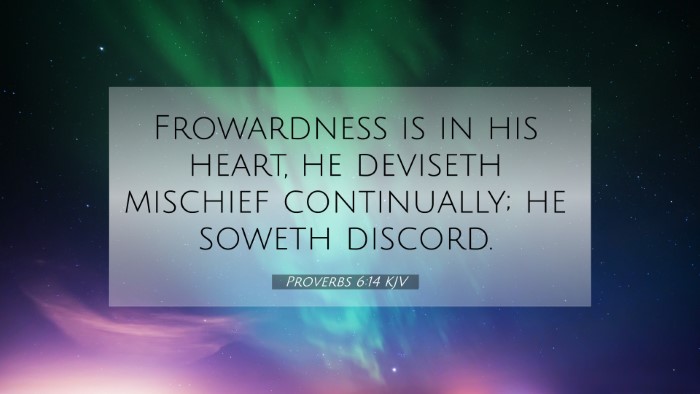Proverbs 6:14 - Meaning and Interpretation
Verse: “Frowardness is in his heart, he deviseth mischief continually; he soweth discord.”
Summary of Key Insights
Proverbs 6:14 warns against the character traits of deceitfulness and harmful intentions present in certain individuals. This verse highlights the inner motivations that lead to malicious behavior. Below, we explore the meanings derived from various public domain commentaries, revealing the biblical perspective on such actions.
Commentary Insights
-
Matthew Henry:
Henry emphasizes the internal corruption described in this verse. The term "frowardness" suggests a deliberate turn away from righteousness. He elaborates that such individuals are not only engaged in mischief themselves but actively work to create discord and division among others. This reflects the broader biblical theme of the heart's condition influencing actions.
-
Albert Barnes:
Barnes points out that the "devising of mischief" indicates a calculated approach to wrongdoing. He notes that the behavior described is not impulsive but rather a product of thoughtful planning aimed at creating strife. The verse serves as a caution against social discord brought about by such individuals.
-
Adam Clarke:
Clarke offers a theological perspective, suggesting that this verse encapsulates the essence of human depravity. He connects this warning to the broader scriptural narrative about the need for wisdom in dealing with others, urging believers to be discerning of those whose hearts are inclined towards evil.
Connections to Other Bible Verses
Proverbs 6:14 interlinks with various scripture passages that address similar themes of deceit, discord, and the moral implications of one’s character:
- Proverbs 16:28: "A froward man soweth strife: and a whisperer separateth chief friends." - This verse mirrors the consequences of a froward heart.
- James 3:16: "For where envying and strife is, there is confusion and every evil work." - Highlights the chaos stemming from discordant actions.
- Galatians 5:15: "But if ye bite and devour one another, take heed that ye be not consumed one of another." - The destructive nature of conflict is echoed here.
- Matthew 5:9: "Blessed are the peacemakers: for they shall be called the children of God." - Sets a contrast to the actions of those sowing discord.
- Romans 16:17: "Now I beseech you, brethren, mark them which cause divisions and offenses contrary to the doctrine..." - Encourages vigilance against divisive individuals.
- Proverbs 1:10: "My son, if sinners entice thee, consent thou not." - Advises against companionship with those who practice mischief.
- Psalms 34:13-14: "Keep thy tongue from evil, and thy lips from speaking guile. Depart from evil, and do good; seek peace, and pursue it." - Advocates for a life of righteousness over wickedness.
Thematic Connections in the Bible
This verse can be explored through various themes found across the scriptures:
- Deception: The Bible frequently warns against deceitful practices, emphasizing integrity and honesty.
- Conflict Resolution: Many verses stress the importance of peacemaking and resolving disputes biblically.
- Character Assessment: A consistent theme in the Bible is the evaluation of one’s heart and character as it directly affects behavior.
Cross-Referencing Biblical Texts
When engaging in Bible studies, utilizing cross-references can enrich understanding. Here’s how you might do that:
- Use a Bible Concordance to find other verses that discuss the heart's intentions.
- Explore a Cross-Reference Bible Study to connect legalism with attitudes of mischief and strife instigation.
- Examine Thematic Bible Verse Connections relating to the ethics of speech and conflict management.
Conclusion
Proverbs 6:14 serves as a critical reminder about the perils of a froward heart and its consequences on society. Understanding this verse in light of related passages enhances our grasp of its message and encourages mutual respect and peace among individuals. Reflecting on these insights and connections can aid in personal growth and better comprehension of scriptural teachings.

















